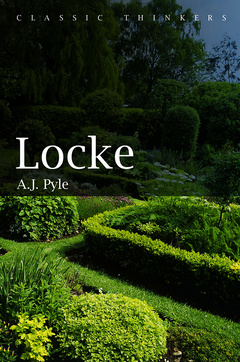Description
Locke
Classic Thinkers Series
Author: Pyle A. J.
Language: English
Subject for Locke:
Keywords
Publication date: 01-2013
224 p. · 15.9x23.6 cm · Hardback
224 p. · 15.9x23.6 cm · Hardback
Description
/li>Contents
/li>Readership
/li>Biography
/li>
John Locke (1632-1704) has a good claim to the title of the greatest ever English philosopher, and was a founding father of both the empiricist tradition in philosophy and the liberal tradition in politics. This new book provides an accessible introduction to Locke?s thought. Although its primary focus is on the Essay Concerning Human Understanding, it also discusses the Two Treatises on Government, the Essay on Toleration, and the Reasonableness of Christianity, and draws on materials from Locke?s correspondence and notebooks to shed light on the contexts of these major works. Locke?s arguments for his central claims are subjected to close scrutiny, and his replies to his main critics evaluated.
A.J. Pyle takes as his guiding theme Locke?s own maxim, that God has given humans enough knowledge for our needs. The philosopher who emerges from these pages is a strikingly modern figure, anti-metaphysical in his attitude both to science and to theology, anti-authoritarian in his politics, and cautiously optimistic about human progress. Locke is indeed one of the founding figures of the Enlightenment, but for Pyle the Lockean Enlightenment is a modest affair of slow and hesitant groping towards the light.
As well as serving as an introduction to Locke for students, the book also helps to correct a number of significant errors and misunderstandings that have marred our understanding of Locke and will spark discussion and debate amongst scholars of his work.
A.J. Pyle takes as his guiding theme Locke?s own maxim, that God has given humans enough knowledge for our needs. The philosopher who emerges from these pages is a strikingly modern figure, anti-metaphysical in his attitude both to science and to theology, anti-authoritarian in his politics, and cautiously optimistic about human progress. Locke is indeed one of the founding figures of the Enlightenment, but for Pyle the Lockean Enlightenment is a modest affair of slow and hesitant groping towards the light.
As well as serving as an introduction to Locke for students, the book also helps to correct a number of significant errors and misunderstandings that have marred our understanding of Locke and will spark discussion and debate amongst scholars of his work.
Abbreviations vi
Introduction: The Unity of Locke's Thought 1
1 Life, Contexts and Concerns 8
2 The Theory of Ideas 31
3 Human Knowledge and Its Limits 54
4 The Material World 77
5 God and Religion 101
6 The Soul and the Afterlife 125
7 The Two Treatises of Government 147
8 Problems of Church and State 173
Notes 196
Select Bibliography 208
Index 214
Undergraduate students of philosophy, political theory, theology politics and law.
Andrew Pyle is Professor of Philosophy at the University of Bristol.
© 2024 LAVOISIER S.A.S.




